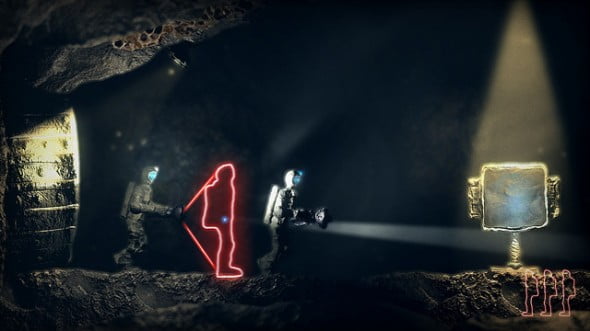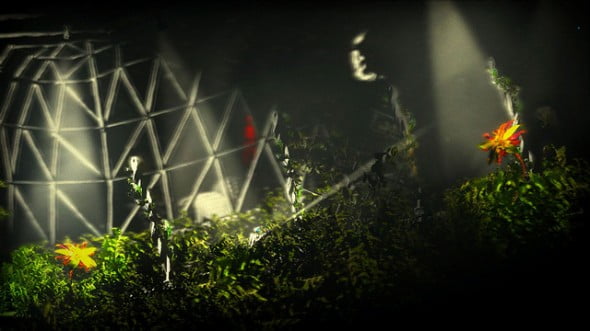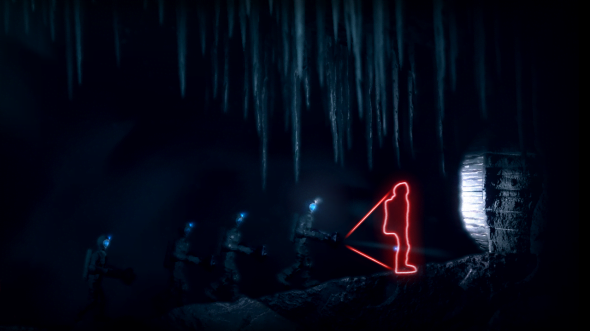Developer: Curve Studios/Facepalm Games
Publisher: Curve Studios
Platform: PlayStation 4
Preview Copy Provided by: Curve Studios
Release Date: August 5, 2014
There’s this wonderful film called Primer by Shane Carruth, that is essentially a film about time travel that’s written by a scientist. It’s a dense, marvel of an experiment, and as you struggle to comprehend all of the information that’s being thrown at you, at a certain point, it just all begins to make sense. It clicks, and you’re having a wonderful, crazy time with it. More than anything, that’s what playing through The Swapper reminded me of. However, where there’s still a degree of disconnect going on between the film and yourself with Primer, here that is eradicated as the heavy, philosophical questions raised seamlessly compliment the gameplay. Everything melds together in what is one of the most different, challenging, satisfying gaming experiences I’ve had in some time.
While merely being presented with a preview copy of the title, this feels like a very much complete experience. The Swapper is interested in having a discussion with you about metaphysics. A big, heavy, complicated metaphysics discussion, and more specifically, digging into the age-old mind/body debate. This is initially presented to you in a rather verbose beginning where people who might as well have space madness dig into this gooey philosophy. However, here all of this melds together so effortlessly with your gaming that these debate indulgences don’t feel out of place or manipulative, but rather conducive to the gameplay, which is pretty amazing.

This adeptness carries through in the game’s writing, which is a delight, as it parses out details with perfect pacing as you slowly piece this puzzle together through conversations with the stranger, or through memory terminals that are spread around throughout the game.
The gameplay here is another of The Swapper’s many triumphs, as the game mechanics and ideas being used here are really wholly unique and innovative; it almost feels like you’re playing Metroid for the first time back in the ’80s. How all of this works is through the use of your Swapper gun (because of course it’s called that) that allows you to create up to four clones of yourself, and then, take control of any said clones (see above re: brilliant mind/body debate incorporation). An added complication here is that all of your clones perfectly mimic your actions in unison. If you move three steps to the left and jump, they’ll move three steps to the left and jump. Obviously this strategy gets you thinking pretty hard and using it creatively, like if you’re about to fall to your death off a cliff, using your Swapper gun to shoot a clone of you on top of the cliff and switch to it right before your previous body smashes into viscera. There’s a bit of restriction in place to keep all of this from getting too unruly, and it’s done with some rather pretty light visuals, such as how blue lights prevent you from creating clones, red prevent you from swapping into another clone, and a purple combination of the two means you can’t use your gun at all. It’s comforting to think that as the final release comes out in the coming weeks, that this already smooth process could be streamlined even further. Every puzzle feels pretty fresh here and offers a legitimate challenge that will leave you satisfied upon completion. These revolve around you trying to obtain orbs which will allow you access to locked off parts of your ship, as you swap between clones, using them to do things like weigh down switches. The game is on the shorter side, at about five hours, so explore this space world to its limit and really try and think these obstacles through rather than running to the nearest walkthrough.

The audio being presented here is similarly impressive, with moody, appropriate music, but also with some wonderful voice acting being done here. It’s not easy to necessarily deliver all of these lines convincingly, but there’s never a problem in delivery, and the uncomfortable, creepy tone is sold well too. When it comes to the other aesthetic of the game, the graphics, the title really steps things up to another level though. Everything you see in this game was hand crafted out of clay and other everyday objects, and then digitized. Light and shadow bounce off of these visuals in such a different way too, that you feel a lot more like you’re in space here, than other titles that offer up a sterile, repetitive series of visuals. This provides you with an undeniably unique, surreal looking experience, which only adds to the already different sort of story you’re embarking on.
All of these strong elements culminate in such an amazingly phenomenal ending that is the icing on the cake to all of this. Really, not enough can be said on how perfect and affecting this ending is. It doesn’t at all go down a conventional path, and this bleak denouement will likely stick with you for days (as it has for me). If this all remains intact upon the final release, there’s nothing about this game that doesn’t scream “winner.”

The Swapper is a triumph on every single level, whether it be its moving voice acting, uncomfortable atmosphere, challenging puzzles, and simplified gameplay. A clear amount of love and effort have been put in here, with the layouts and models being hand crafted through clay to push the originality factor to the roof. Furthermore, long philosophical debates that may feel out of place in other titles actually perfectly mirror the innovative clone swapping gameplay here, complimenting everything. The Swapper is a stand-out title that should be played by everyone, puzzle fan or not, to witness what it is doing here. While not the final version of the game, an extremely strong foundation has already been built that only has the opportunity to become stronger come August.